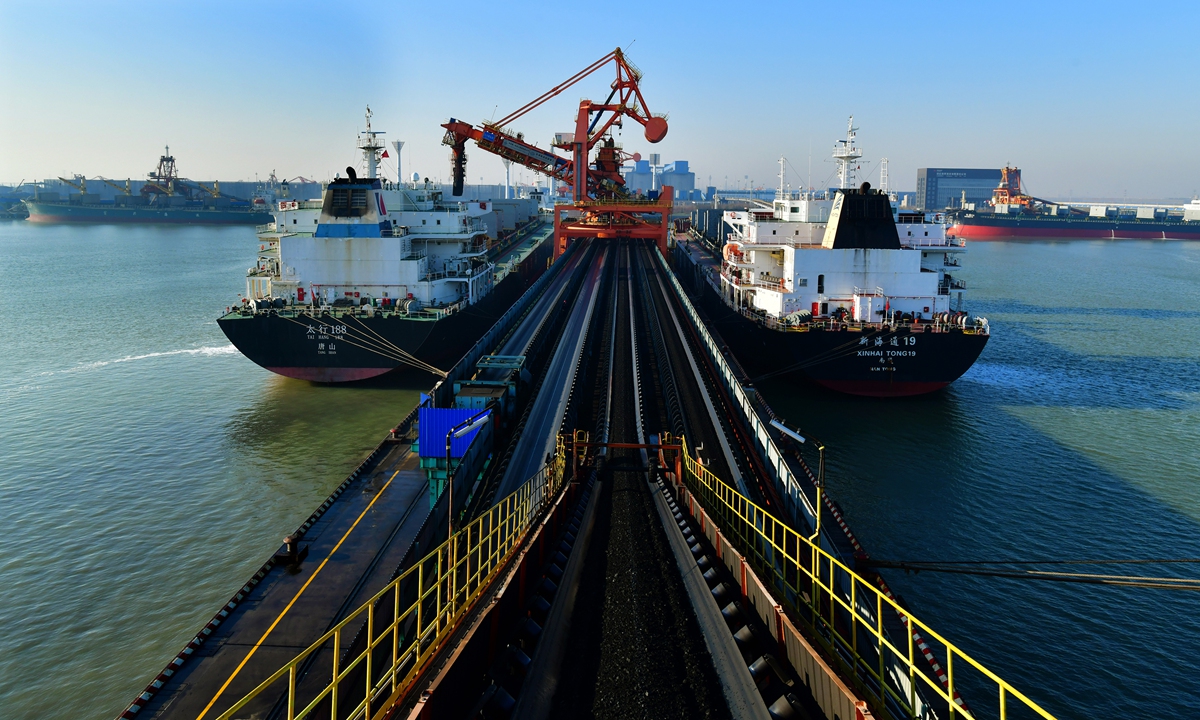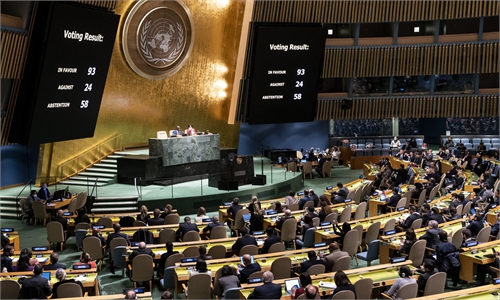
A vessel docks at Huanghua port, North China's Hebei Province to load coal in December 2021. Photo: cnsphoto
As the EU imposed embargoes on coal from Russia, which is a major global supplier, international coal prices continue to hike, raising concerns over energy supply and security.
For China, which is the world's largest coal importer, however, only eight percent of its supply is dependent on imports. Therefore, the international coal prices and supply turbulences will have little impact on domestic coal supply, or at least the impact is controllable, analysts said.
On Friday, the EU imposed a fifth package of sanctions on Russia, including an import ban on all forms of Russian coal. This will affect one fourth of all Russian coal exports, amounting to a loss of around 8 billion euro ($8.7 billion) of revenue per year for Russia, according to European Commission.
Russia exported more than 200 million tons of coal in 2021, accounting for 17 percent of global coal exports and nearly 50 million tons to Europe. And for some major economies in Europe, the share is even higher.
For instance, Germany received 55 percent of its natural gas, 50 percent of its coal, and 35 percent of its oil from Russia, according to Germany's Economy Minister.
The EU embargoes mean that about 50 million tons of Russia coal need to find new markets, while the EU also needs to find other sources to fill the 50-million-ton gap, an analyst surnamed Li from an industry association, told the Global Times on Sunday.
"For both sides, the need is in emergency, which will definitely push up global exporters' coal prices. But Russian coal prices may see a decline if it is in a hurry to sell energy. In any case, the global coal market faces turbulence as the current relationship between demand and supply is disrupted," said Li.
Energy consumption will continue to grow, and we expect global consumption to reach 8 billion tons of standard coal in 2022. And, there are clear signs that coal, natural gas and other new energy prices will still continue to rise, according to Li.
Largest importer
China imported 323 million tons of coal in 2021, up 6.6 percent year-on-year, with a total import value of 231.93 billion yuan ($36.4 billion), up 64.1 percent year-on-year, according to statistics released by the General Administration of Customs.
The major sources of imported thermal coal were Indonesia, Russia, Mongolia, South Africa, Colombia, the US, Canada, Kazakhstan and the Philippines in 2021, according to statistics from the customs.
Indonesia is the biggest coal exporter to China. In 2021, China imported about 190 million tons of coal from Indonesia, accounting for nearly 60 percent of its imports.
A coal analyst surnamed Wang, told the Global Times that the price hike of Indonesian coal will indeed have an impact on the domestic coal imports, especially in northern China.
In April, the benchmark price of Indonesian thermal coal was quoted at $288.4 per ton, up 41.59 percent from March, and up 232.72 percent year-on-year, setting a new high.
"The rise in Indonesian coal prices further widens the price difference between domestic and foreign coal. The high price difference will further restrain the enthusiasm of import in northern China and thus have a great impact on supply," said Wang.
According to Wang, after considering calorific value, sea freight, exchange rates and value-added tax, the corresponding price of Indonesian coal arriving at ports in northern China is calculated to be 1,925 yuan per ton, which is about 576 yuan per ton higher than the cost at ports in southern China.
Big producer
But Li said that although China is the world's largest importer of coal, it is only eight percent dependent on imports, since it is also a big producer of coal.
"Because of the global coal trading scale is about 1.3 billion tons per year, China's imports of 300 million tons holds a pivotal position in the whole world. In many cases, it is China's coal market that drives the global coal trade, and changes in China's supply and demand determine the direction of global coal prices," Li noted.
According to Li's association, by the end of 2021, the effective production capacity of China's coal industry reached 4.15 billion tons.
Li also said that China's sources of coal imports are diversified, which helped reduce the risks of turbulences in supply and prices.
"More and more countries will want to sell coal to China, since it will probably remain to be the world's largest coal importer in the next five years. Because of the COVID-19 pandemic, the global economic outlook is grim. Earning foreign currency by exporting coal and other minerals is one of the best ways to escape an economic haze for many energy exporters," said Li.
Since China's coal capacity expansion has been largely for internal supply, with little export, and other large coal producers are struggling to quickly ramp up production after a long period of depressed capital spending, imbalances in global coal trade are inevitable, and the result of falling supply is a sharp rise in international coal prices, an analyst from the Chinese Academy of Social Sciences, who declined to be named, told the Global Times on Sunday.
"China could digest some of the Russian coal that is banned from exporting to the EU. But since the situation of Russia-Ukraine conflict is changing from time to time, it's hard to make a conclusion on whether the embargo will indeed work," the analyst said.



